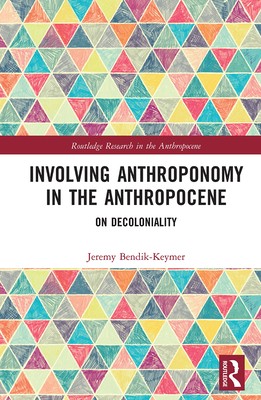
- We will send in 10–14 business days.
- Author: Jeremy Bendik-Keymer
- Publisher: Routledge
- ISBN-10: 1032236078
- ISBN-13: 9781032236070
- Format: 15.6 x 23.4 x 1.1 cm, minkšti viršeliai
- Language: English
- SAVE -10% with code: EXTRA
Reviews
Description
This book introduces the idea of anthroponomy - the organization of humankind to support autonomous life - as a response to the problems of today's purported "Anthropocene" age. It argues for a specific form of accountability for the redressing of planetary-scaled environmental problems.
The concept of anthroponomy helps confront geopolitical history shaped by the social processes of capitalism, colonialism, and industrialism, which have resulted in our planetary situation. Involving Anthroponomy in the Anthropocene: On Decoloniality explores how mobilizing our engagement with the politics of our planetary situation can come from moral relations. This book focuses on the anti-imperial work of addressing unfinished decolonization, and hence involves the "decolonial" work of cracking open the common sense of the world that supports ongoing colonization. "Coloniality" is the name for this common sense, and the discourse of the "Anthropocene" supports it. A consistent anti-imperial and anti-capitalist politics, one committed to equality and autonomy, will problematize the Anthropocene through decoloniality. Sometimes the way forward is the way backward.
Written in a novel style that demonstrates - not simply theorizes - moral relatedness, this book makes a valuable contribution to the fields of Anthropocene studies, environmental studies, decolonial studies, and social philosophy.
EXTRA 10 % discount with code: EXTRA
The promotion ends in 21d.15:42:23
The discount code is valid when purchasing from 10 €. Discounts do not stack.
- Author: Jeremy Bendik-Keymer
- Publisher: Routledge
- ISBN-10: 1032236078
- ISBN-13: 9781032236070
- Format: 15.6 x 23.4 x 1.1 cm, minkšti viršeliai
- Language: English English
This book introduces the idea of anthroponomy - the organization of humankind to support autonomous life - as a response to the problems of today's purported "Anthropocene" age. It argues for a specific form of accountability for the redressing of planetary-scaled environmental problems.
The concept of anthroponomy helps confront geopolitical history shaped by the social processes of capitalism, colonialism, and industrialism, which have resulted in our planetary situation. Involving Anthroponomy in the Anthropocene: On Decoloniality explores how mobilizing our engagement with the politics of our planetary situation can come from moral relations. This book focuses on the anti-imperial work of addressing unfinished decolonization, and hence involves the "decolonial" work of cracking open the common sense of the world that supports ongoing colonization. "Coloniality" is the name for this common sense, and the discourse of the "Anthropocene" supports it. A consistent anti-imperial and anti-capitalist politics, one committed to equality and autonomy, will problematize the Anthropocene through decoloniality. Sometimes the way forward is the way backward.
Written in a novel style that demonstrates - not simply theorizes - moral relatedness, this book makes a valuable contribution to the fields of Anthropocene studies, environmental studies, decolonial studies, and social philosophy.


Reviews